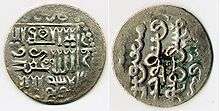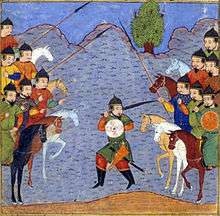Baydu


Baydu (also spelled Baidu (Байду)) (died 1295) was the sixth ruler of the Mongol empire's Ilkhanate division in Iran. He was the son of Taraqai, who was in turn the fifth son of Hulagu Khan.[1] He succeeded his cousin Gaykhatu as khan of the Ilkhanate state in 1295.
Gaykhatu had been killed by a group of conspirators led by Taghachar, a commander in the Mongol army, who then placed Baydu in power. Baydu was considered easygoing and controllable, and under him, the Ilkhanate was divided among the co-conspirators.[2]
Baydu had strong sympathies to Christianity,[3] but was required to act outwardly as a Muslim.[4] According to Saunders in Mongol Conquests, Baydu allowed churches on his ordo and wore a cross around his neck.[5] He was urged by his followers to rid himself of Ghazan, the son of Arghun Khan, but refused out of affection. However, his followers gradually deserted him, in part because of the intrigues of Emir Nauruz. Ghazan made war on Baydu, marching with a Muslim army from Khorasan.[1] Baydu attempted to escape and flee from Azerbaijan to Georgia, but was taken prisoner near Nakhichevan after being defeated in battle.[1][6] After only five months in power he was taken to Tabriz and executed on the 5 October 1295, ending the civil war with his successor Mahmud Ghazan.[1]
Notes
- 1 2 3 4 Stevens, John. The history of Persia. Containing, the lives and memorable actions of its kings from the first erecting of that monarchy to this time; an exact Description of all its Dominions; a curious Account of India, China, Tartary, Kermon, Arabia, Nixabur, and the Islands of Ceylon and Timor; as also of all Cities occasionally mention'd, as Schiras, Samarkand, Bokara, &c. Manners and Customs of those People, Persian Worshippers of Fire; Plants, Beasts, Product, and Trade. With many instructive and pleasant digressions, being remarkable Stories or Passages, occasionally occurring, as Strange Burials; Burning of the Dead; Liquors of several Countries; Hunting; Fishing; Practice of Physick; famous Physicians in the East; Actions of Tamerlan, &c. To which is added, an abridgment of the lives of the kings of Harmuz, or Ormuz. The Persian history written in Arabick, by Mirkond, a famous Eastern Author that of Ormuz, by Torunxa, King of that Island, both of them translated into Spanish, by Antony Teixeira, who liv'd several Years in Persia and India; and now render'd into English.
- ↑ Atwood, p. 525
- ↑ Jackson, p. 176
- ↑ Atwood, p. 253
- ↑ Saunders, p. 135
- ↑ Steppes, pp. 377-378
References
- Atwood, Christopher P. (2004). The Encyclopedia of Mongolia and the Mongol Empire. Facts on File, Inc. ISBN 0-8160-4671-9.
- Jackson, Peter (2005). The Mongols and the West, 1221-1410. Longman. ISBN 0-582-36896-0.
- Saunders, J.J., The History of the Mongol Conquests
- Grousset, Rene, Empire of the Steppes
| Regnal titles | ||
|---|---|---|
| Preceded by Gaykhatu |
Ilkhanid Dynasty 1295 |
Succeeded by Mahmud Ghazan |